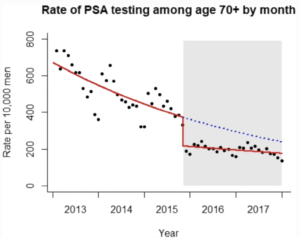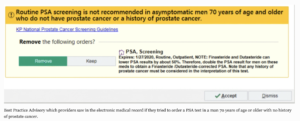Kaiser Permanente study shows improved adherence to PSA testing recommendations
A computerized alert that notifies health care providers when a prostate cancer screening test is not recommended quickly and substantially improved adherence to cancer screening guidelines, new Kaiser Permanente Northern California (KPNC) research shows.
 The study was published in the Journal of General Internal Medicine.
The study was published in the Journal of General Internal Medicine.
Multiple guidelines advise against annual prostate-specific antigen (PSA)-based cancer screening in men age 70 or over. “We don’t recommend PSA screening in asymptomatic men that age because we have no data from randomized trials that shows a benefit,” said the study’s lead author Joseph Presti, MD, an adjunct investigator at the Kaiser Permanente Northern California Division of Research.

Studies have found that, nationwide, about 33% of men age 70 and over have an annual PSA test. “After we implemented this intervention,” said Presti, the regional leader of Urologic Oncology Surgery with The Permanente Medical Group, “we brought screening rates down from 33% to about 12%. This shows the power of the way we can use our electronic medical system to support personally tailored care.”
The research team activated the intervention — a best practice advisory — on Oct. 15, 2015. Starting that morning, every Kaiser Permanente health care provider in Northern California who put in an electronic request for a PSA test for a man age 70 or older received an immediate on-screen alert explaining, “Routine PSA screening is not recommended in asymptomatic men 70 years of age and older who do not have prostate cancer or a history of prostate cancer.” The alert also included a link to the Kaiser Permanente national prostate cancer screening guidelines. After seeing the alert, the health care provider had the option to cancel or proceed with the request for a PSA test.
 “There are literally hundreds of guidelines with multiple details and keeping track of all of them is virtually impossible,” said the study’s senior author Andrew L. Avins, MD, MPH, a research scientist at the Division of Research. “Many types of interventions have been developed to improve medical decision-making and the quality of care that physicians provide, but most turn out to be of little or no benefit in improving clinical care. The beauty of this intervention is that it doesn’t require physicians to remember complex guidelines. It simply provides clear information at the point of care to help guide appropriate screening practices.”
“There are literally hundreds of guidelines with multiple details and keeping track of all of them is virtually impossible,” said the study’s senior author Andrew L. Avins, MD, MPH, a research scientist at the Division of Research. “Many types of interventions have been developed to improve medical decision-making and the quality of care that physicians provide, but most turn out to be of little or no benefit in improving clinical care. The beauty of this intervention is that it doesn’t require physicians to remember complex guidelines. It simply provides clear information at the point of care to help guide appropriate screening practices.”
Prostate cancer is the most common cancer in men in the U.S. According to the American Cancer Society, this year close to 192,000 men will be diagnosed with prostate cancer and more than 33,000 will die from the disease. Guidelines recommend shared decision-making — conversations between patients and their doctors — about the benefits and risks of PSA-based cancer screening for men between the ages of 50 to 69. Men who are in a high-risk category, which includes Black men and men with a family history of prostate cancer, should begin PSA screening at age 45.
The best practice screening intervention used in this study has been in place at KPNC since it was initially implemented in 2015. Presti and Avins are currently developing a prostate cancer risk calculator to help men going through prostate cancer screening decide whether to have a biopsy if their test shows a higher than normal PSA level.
Widespread use of a similar prostate cancer screening best practice advisory could potentially benefit patients and health care providers outside of Kaiser Permanente. “I couldn’t think of a simpler way to intervene,” said Presti. “Just this one best practice alert and, boom, it completely changed practice.”
This study was supported by The Permanente Medical Group Delivery Science and Applied Research and Physician Researcher Programs and the Kaiser Permanente Northern California Community Benefit Program.
Co-authors include Stacey Alexeeff, PhD, Brandon Horton, MPH, and Stephanie Prausnitz, MS, of the Kaiser Permanente Division of Research.
# # #
About the Kaiser Permanente Division of Research
The Kaiser Permanente Division of Research conducts, publishes and disseminates epidemiologic and health services research to improve the health and medical care of Kaiser Permanente members and society at large. It seeks to understand the determinants of illness and well-being, and to improve the quality and cost-effectiveness of health care. Currently, DOR’s 600-plus staff is working on more than 450 epidemiological and health services research projects. For more information, visit divisionofresearch.kaiserpermanente.org or follow us @KPDOR.





This Post Has 0 Comments